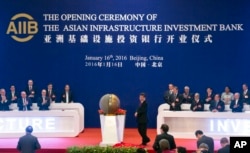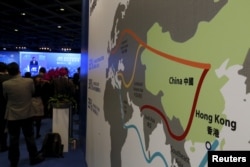The Beijing-based Asian Infrastructure Investment Bank stresses its independence from China's influence and says its project decisions are objective, but at the bank's first annual general meeting this weekend, it was clear some members are concerned about that very question.
The meeting revealed the new bank is sanctioning four project loans worth $509 million since it was launched last January.
AIIB has also partnered with three other multilateral development banks — the World Bank, the Asian Development Bank and the European Bank for Reconstruction and Development — for co-financing projects.
But concerns remain that China, the AIIB's biggest shareholder, will greatly influence its operations, and guide the bank to support projects in Beijing's "One Belt, One Road," also known as the Silk Road program.
Chinese Vice Premier Zhang Gaoli, who spoke at the bank meeting, advised the bank to support member countries and synergize its plans with the Silk Road. He particularly referred to the inadequate infrastructure in Central Asia, which is a crucial Silk Road link to connect China with Europe.
China holds 20.6 percent of the bank's shares, while all other shareholders have less than 7.5 percent each.
AIIB Vice President and former British treasury minister Danny Alexander tried to allay the concerns about the bank's independent governance.
"China, as much as other shareholders, has been very supportive of the governance standards that we're setting and of the transparency around the bank's operations," he said.
Korean concern
But South Korea's finance minister, and AIIB governor, IIho Yoo did not appear fully satisfied.
"The roles of the management and the board should be more clearly defined. Over the past six months, the basic framework for operation took shape, but there is still much to be done," Yoo said, adding the bank needs to develop its environmental and social framework.
He said the bank needs to foster trust in its operations, "In particular, building a strong organization over the longer term will require the bank to be operated in an efficient manner based on trust and transparency."
South Korea caused some surprise last year when it announced plans to join as a founder member of AIIB, despite Washington's strong reservations about the bank. The United States and Japan have kept out of the bank, which has 57 members.
Drawing on China's experience
Critics have said the AIIB would ignore the best practices adopted by the World Bank in areas like environmental assessment, and social and labor standards in infrastructure projects.
AIIB President Jin Liqun made it clear the new bank does not consider the Western model as the best option. He would prefer to draw on the experience of China, which is the world's biggest infrastructure builder.
"The question is, how do you define international best practice? I will not agree to anything which could be considered international best practice unless this kind of best practice incorporates the development experience of China and many countries in Asia and elsewhere over the last three or four decades," Jin said.
"So our bank would like to have the development experience, the so-called international best practice, reflecting the experience of China, India [and] so many countries in Asia. So we should have a different model of development," he added.
World Bank's caution
The AIIB board met Saturday to sanction loans amounting to $509 million for four projects in Pakistan, Tajikistan, Indonesia and Bangladesh. The projects in Pakistan and Tajikistan are part of China's Silk Road program.
The World Bank has partnered with the AIIB for a slum improvement project in Indonesia. The World Bank took on the responsibility of environmental assessment and procurement, which includes hiring construction contractors. There have been fears AIIB-backed projects might favor Chinese contractors, and be less stringent on implementing environmental standards.
Joachim von Amsberg, AIIB vice president for policy and strategy, said the Indonesian project draws on many years of partnership between the World Bank and the government in Jakarta.
"We [the AIIB] came relatively late to this project, and complemented the financing. So, it was natural for us to rely on the work done between the government of Indonesia and the World Bank," Amsberg told VOA.
Chinese donation
Zhang announced China would contribute $50 million to a new bank fund to assist member countries with project preparation. China is the only member to contribute beyond the requirement of its shareholding.
The World Bank does not accept donations that can give greater influence to one or two members in the project preparation stage that ultimately leads to loan approvals.
An AIIB official explained that this contribution would make no difference to China's influence because the fund is meant to support feasibility and other studies at the technical level during the project preparation process. Some other member countries may also contribute to the fund in the coming months, although with smaller sums of $10 million or $15 million, he said.












